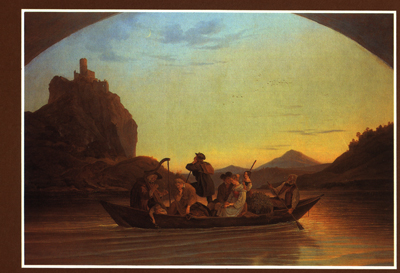A cage went in search of a bird

February 23. Unwritten letter.
–Kafka, The Blue Octavo Notebooks (Fourth Notebook)
Anarchism as the Source Decay of Royalism

They were given the choice of becoming kings or the kings’ messengers. As is the way with children, they all wanted to be messengers. That is why there are only messengers, racing through the world and, since there are no kings, calling out to each other the messages that have now become meaningless. They would gladly put an end to their miserable life, but they do not dare to do so because of their oath of loyalty.
–Kafka, Blue Octavo Notebooks (Third Notebook)
May 20th, 2009 / 4:25 pm
Myths of History / Histories of Myths, with your host, Franz Kafka

The history of the world, as it is writen and handed down by word of mouth, often fails us completely; but man’s intuitive capacity, though it often misleads, does lead, does not ever abandon one. And so, for instance, the tradition of the seven wonders of the world has always had associated with it the rumor that there was another, an eight wonder of the world, and concerning this eighth wonder there were various, perhaps contradictory, statements made, the vagueness of which was explained by the obscurity of ancient times.
—The Blue Octavo Notebooks (Second Notebook)
Something Baffling, Something Bloom: In which I follow H.B.’s advice and start reading Kafka’s Blue Octavo Notebooks

February 19, 1917.
Today read Hermann und Dorothea, passages from Richter’s Memoirs, looked at pictures by him, and finally read a scene from Hauptmann’s Griselda. For the brief span of the next hour am a different person. True, all prospects as misty as ever, but pictures in the mist now different. The man in heavy boots I have put on today for the first time (they were originally intended for military service) is a different person.
–The First Notebook
May 14th, 2009 / 4:12 pm
Power Quote: One of Harold Bloom’s Hands Clapping Edition

This one’s for my homies who asked for a more detailed commentary on Dickens/Bloom that I don’t have time to offer up this week.
One of the blessings of Dickens’s powerful influence on Kafka is the altogether Borgesian impact of Kafka on our understanding of Dickens.
– The Western Canon, “The Canonical Novel: Dickens’s Bleak House and George Eliot’s Middlemarch“
checking back in with Joshua Cohen and Kafka’s Office Writings


I’m sure you’ve all been keeping up this week with Nextbook.org’s five part series on Kafka’s Office Writings, which I first blogged about on Monday. But in case you haven’t, this is a good time to look over what you’ve missed so you can be all caught up for the big (?) finale tomorrow. The series, as I’ve mentioned now several times, is authored by Joshua Cohen, quite possibly the youngest working critic to be described non-ironically as “venerable,” assuming he has ever actually been called that before, which, if he hasn’t–well he has now.
(clicking anywhere on the text of a given day takes you to that day on Nextbook)
+
+
+
+
After you’ve had your fill of nonfiction, consider perhaps some of his other literature. Cohen is the author of five fine books out from presses that Giant readers and contributors alike have deep affection for: A Heaven of Others (Starcherone, 2008), Two Tribal Stories (Small Anchor, 2007), Aleph-Bet: An Alphabet for the Perplexed (Six Gallery, 2007), Cadenza for the Schneiderman Violin Concerto (Fugue State, 2007), The Quorum (Twisted Spoon, 2005). A new novel, Graven Imaginings, is forthcoming from Dalkey Archive. Better get on over to his website and see what the score is.

ALL THIS WEEK: Sympathy for the Cubicle Rat at Nextbook.org, starring Franz Kafka and Joshua Cohen

not Joshua Cohen. Or Kafka.
Check back at Nextbook.org every day this week for a new installment of Joshua Cohen’s writing about Kafka’s Office Writings. Also, there may be periodic updates here, highlighting our favorite pieces from the series and/or reminding you to go read it.

Who could say no to this mug?

Or this bug?
